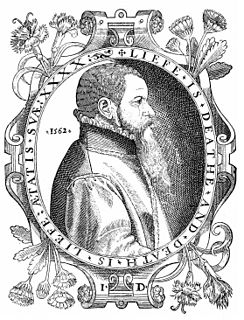Related Research Articles

John Foxe, an English historian and martyrologist, was the author of Actes and Monuments, telling of Christian martyrs throughout Western history, but particularly the sufferings of English Protestants and proto-Protestants from the 14th century and in the reign of Mary I. The book was widely owned and read by English Puritans and helped to mould British opinion on the Catholic Church for several centuries.
John Taylor was an English churchman and academic, Bishop of Lincoln from 1552 to 1554.

Martyr's Mirror or The Bloody Theater, first published in Holland in 1660 in Dutch by Thieleman J. van Braght, documents the stories and testimonies of Christian martyrs, especially Anabaptists. The full title of the book is The Bloody Theater or Martyrs Mirror of the Defenseless Christians who baptized only upon confession of faith, and who suffered and died for the testimony of Jesus, their Saviour, from the time of Christ to the year A.D. 1660. The use of the word defenseless in this case refers to the Anabaptist belief in non-resistance. The book includes accounts of the martyrdom of the apostles and the stories of martyrs from previous centuries with beliefs similar to the Anabaptists.

John Day was an English Protestant printer. He specialised in printing and distributing Protestant literature and pamphlets, and produced many small-format religious books, such as ABCs, sermons, and translations of psalms. He found fame, however, as the publisher of John Foxe's Actes and Monuments, also known as the Book of Martyrs, the largest and most technologically accomplished book printed in sixteenth-century England.

Robert Horne was an English churchman, and a leading reforming Protestant. One of the Marian exiles, he was subsequently bishop of Winchester from 1560 to 1580.

Lunan is a hamlet in Angus, Scotland, in the parish of the same name, 6 kilometres (3.7 mi) south of Montrose. The hamlet overlooks Lunan Bay, which is itself also a hamlet, at the mouth of the Lunan Water. A 16th-century priest of Lunan church, which is in the hamlet of Lunan Bay, Walter Mill, was one of the last Scottish Protestant martyrs to be burned at St. Andrews. The church itself was rebuilt in 1844. The 15th-century Red Castle, so called from the red sandstone it is built from, is located 500 metres (1,600 ft) to the south of the hamlet, on the south bank of the Lunan Water.
John Forman was a Protestant martyr burned at the stake in East Grinstead, England, on 18 July 1556 along with Thomas Dungate and Anne Tree.

The Colchester Martyrs were 16th-century English Protestant martyrs. They were executed for heresy in Colchester, Essex, during the reigns of Henry VIII and Mary I. Their story is recorded in Foxe's Book of Martyrs.
Margaret Polley was an English Protestant martyr from Popingberry, Rochester, Kent. Her story is recorded in Foxe's Book of Martyrs.
Christopher Wade was an English Protestant martyr. His story is recorded in Foxe's Book of Martyrs.
The Canterbury Martyrs were 16th-century English Protestant martyrs. They were executed for heresy in Canterbury, Kent, and were the last Protestants burnt during the reign of Mary I. Their story is recorded in Foxe's Book of Martyrs.
The Windsor Martyrs were English Protestants martyred at Windsor in 1543. Their names were Robert Testwood, Anthony Pearson and Henry Filmer.
The Perth Martyrs were six people executed in Perth, Scotland in 1543 for their Protestant beliefs. The condemned people were William Anderson, James Finlayson, James Hunter, Robert Lamb, James Raveleson and Helen Stark. They were sentenced to death for their beliefs, after being convicted by the Archbishop of St Andrews. Anderson, Finlayson, Hunter and Lamb were sentenced to be hanged, Raveleson was to be burnt; and Helen Stark, "with her sucking infant", was to be put into a sack and drowned. Their story is recorded in Foxe's Book of Martyrs, in Calderwood's History of the Kirk of Scotland and in James Anthony Froude's History of England.
Thomas Tomkins was a 16th-century English Protestant martyr. He was a weaver from Shoreditch, London, and was examined by Bishop Bonner. Despite having been subjected to torture, he insisted that he did not believe in transubstantiation. As a result, he was burned to death at Smithfield on 16 March 1555. His story is recorded in Foxe's Book of Martyrs.
John Lawrence was a sixteenth-century English Protestant martyr. His story was recorded in Foxe's Book of Martyrs.

The Actes and Monuments, popularly known as Foxe's Book of Martyrs, is a work of Protestant history and martyrology by Protestant English historian John Foxe, first published in 1563 by John Day. It includes a polemical account of the sufferings of Protestants under the Catholic Church, with particular emphasis on England and Scotland. The book was highly influential in those countries and helped shape lasting popular notions of Catholicism there. The book went through four editions in Foxe's lifetime and a number of later editions and abridgements, including some that specifically reduced the text to a Book of Martyrs.

The Stratford Martyrs were eleven men and two women who were burned at the stake together for their Protestant beliefs, either at Stratford-le-Bow, Middlesex or Stratford, Essex, both near London, on 27 June 1556 during the Marian persecutions.

The Guernsey Martyrs were three women who were burned at the stake for their Protestant beliefs, in Guernsey, Channel Islands, in 1556 during the Marian persecutions.

St Helen's Church, Ipswich is an Anglican church in Ipswich, Suffolk, England. The church is built from knapped flint rubble with additional stone and white brick dressings. Although some of the building dates back to the medieval period, the building was substantially altered in the nineteenth century.
References
- ↑ p.257, John Foxe, Foxe's Book of Martyrs , 2000, Ambassador Publications